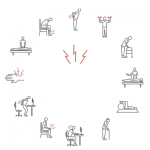“Driving is the riskiest thing we do on a daily basis,” says Atchley, who wasn’t involved in the study.
“We need to understand what’s at risk, so that we as drivers can make better choices,” he says.
ad goes here:advert-1
ADVERTISEMENT
SCROLL TO CONTINUE
“What’s unique about this study isn’t just painkiller use, but the pattern of use,” Atchley points out.
The risk of being injured or killed in a car crash increases with age, according to the Centers for Disease Control and Prevention (CDC).
ad goes here:advert-2
ADVERTISEMENT
SCROLL TO CONTINUE
Meuser notes that older adults generally have more diagnoses and take more medications than younger adults. “There’s always a risk for side effects for someone taking five or more medications,” he says. “Side effects that affect the brain and nervous system are especially worrisome for older drivers.”



